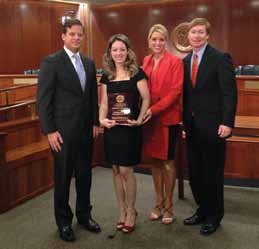Working to identify human trafficking victims

From left, Florida Lt. Gov. Carlos Lopez-Cantera, Collier County Sheriff’s Office Victim Advocate Marisol Schloendorn, state Attorney General Pam Bondi,
and state Commissioner of Agriculture Adam Putnam. Schloendorn was honored as Outstanding Victim Advocate for her work with victims of human trafficking
at a ceremony in Tallahassee on April 9. Photo by Sgt. Wade Williams/CCSO
For years, Alba Guzman was known in the Immokalee community as a madam who had underage girls working for her against their will.
And for years deputies would go to Guzman’s trailer on South 2nd Street and she would deny it was being used for prostitution.
“For years we heard stuff and kept an eye on her,” said Marisol Schloendorn, a victim advocate who, along with Detective Andy Henchesmoore make up the Collier County Sheriff’s Office’s Human Trafficking Unit.
The break finally came March 3, 2012, when CCSO road patrol deputies responded to a complaint from the community that women were selling their bodies for sex out of Guzman’s trailer. Deputies had rounded up 15 men and two women from inside the trailer when Schloendorn and Detective Henchesmoore arrived. Detective Henchesmoore and Schloendorn interviewed the women, one of whom produced a crucial cell phone video showing the 54-year-old Guzman receiving money from a man paying for sex. They concluded that the women were selling their bodies for sex but weren’t being held against their will.
Guzman was arrested on a felony charge of living off the proceeds from prostitution and eventually deported back to her native Colombia. And while she wasn’t formally
charged with human trafficking, the investigation revealed that her Immokalee trailer was one of the stops that human trafficking victims regularly made while working the prostitution circuit in Florida.
“She was part of the human trafficking web,” Schloendorn said.
The Guzman case was one of seven human trafficking cases CCSO worked in 2013. The cases involved both foreign and domestic victims.
Since 2007, the CCSO Human Trafficking Unit has helped remove 67 victims from trafficking – sex trafficking to labor trafficking.
Schloendorn has been assigned to the Human Trafficking Unit since 2006 and Detective Henchesmoore since 2012. While Detective Henchesmoore investigates tips of human trafficking, Schloendorn acts as a mentor to the victims, counseling them and attending their court hearings.
In April, the Florida State Attorney General’s Office honored Schloendorn with the 2014 Distinguished Services Award for Outstanding Victim Advocate for her work with human trafficking victims.
Human trafficking cases can be the most complicated and time-consuming cases law enforcement agencies can investigate. When a victim is rescued from a trafficking situation they commonly have nothing except the clothes on their back. They typically suffer from a variety of problems that include drug and alcohol addiction, mental illness and past traumatic abuse.
Victims of human trafficking are very reluctant to disclose their situation, especially to law enforcement, due to myriad issues such as fear, coercion, threats, extortion,
manipulation by the traffickers or that they won’t be believed. Many involved in commercial sex are repeatedly and commonly abused by their pimp.
“If a pimp is involved, there is a very high likelihood that some sort of coercion exists and that the relationship is not voluntary,” said Sgt. Wade Williams of the CCSO
Exploitation Section, which oversees the Human Trafficking Unit.
However, many prostitutes think of their pimp as a ‘boyfriend’ and will say they do not have a pimp. “The notion that most prostitutes are working voluntarily is a distortion of the reality,” said Sgt. Williams.
Due to their delicate situation, building their trust and providing them with the myriad services that they need to reintegrate into society can be an extremely difficult task.
For Schloendorn this usually means texts and phone calls day and night, and responding to victims when they are in crisis. It also means arranging and taking victims to necessary appointments and interviews, helping them get required documents such as a driver’s license, and other necessary functions.
“The victim advocate must be able to break the psychological chains of the trafficker, provide all of the necessary services, stay in constant communication and build a quality rapport with the victim if we are to succeed in the prosecution,” said Sgt. Williams.
Schloendorn recognizes that working closely with the community is one of the best ways to serve and to identify victims. She organizes annual outreach events to raise awareness and to develop information regarding human trafficking. These events typically draw 300 to 800 people as well as local media and public officials.
Schloendorn frequently adjusts her work schedule to provide these services, which means working many nights and weekends. She constantly goes out of her way to innovate new ways of providing the best services for victims and for new ways of identifying victims.
“She doesn’t simply do what is required of her,” Sgt. Williams said. “She feels a personal sense of responsibility to the victims in her cases.”

Leave a Reply
Want to join the discussion?Feel free to contribute!